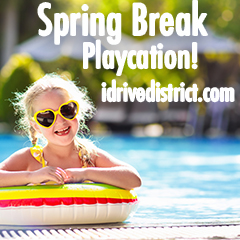When Sharing Isn’t Caring
Modern parents walk a fine line between singing kids’ praises on social media and invading their privacy.
For most of us, scrolling through Facebook or Twitter results in an endless parade of status updates featuring children—only they’re usually delivered by parents rather than the kids in question. Maybe it’s pictures of a child’s first hit at a baseball game, or a rant accompanied by a photo of a leftover plate of spaghetti that a 6-year-old refused to finish, or even throwback images of embarrassing childhood outfits worn by now-adult offspring. After all, you can’t share too much information on social media, right?
OK, opinions differ, but sharing has become a new societal norm. Naturally, parents have their reasons. “Typically, I post because I’m proud of my children and I want other people, like family members that live far away, to see what they are doing,” says Mary P., a local mother in Winter Park. “Other times, I like to share humorous posts with my friends, and then they share their children’s funny stories, too.”
Mary’s daughter Rachel, on the other hand, isn’t always appreciative of her mom’s impromptu publicity campaigns. “Sometimes I think it’s embarrassing when my parents post certain things that I may not want my friends’ moms or whoever else to know about,” she says. “It’s not cool when your friends’ parents are talking about you and what your parent posted on Facebook.”
Similarly, 9-year-old Maitland resident Kylie S. has been mortified by some of the milestones shared by her mom Erin. “[There] are things that my mom posts that I might not want everyone and their parents to see,” she says. “Especially since some of those pictures can be pretty embarrassing.”
Without doubt, there’s a thin line between “sharenting”—the act of sharing information about kids via social media—and its ugly cousin, “oversharenting,” leaving parents with a careful balancing act. Because if the sharing upsets kids now or could down the road, clicking that “post” button could be doing more harm than good in the long run.
Respecting Their Boundaries
There’s no clear consensus on what constitutes oversharing, but kids are generally more aware of the problem than their parents. “We see, especially now, students expressing concern about their parents posting sensitive and personal information on their Facebook pages for everyone to see,” says Christine Jobin, student advisor at Full Sail University. “There isn’t enough conversation about what is acceptable and what’s not.”
Dr. Adrienne Trier-Bieniek, professor of sociology at Valencia College, seems to agree. “With parents, one thing to keep in mind is that oversharing images of your kids or family life does have consequences,” she says. “Kids can’t really give consent to their image or likeness being presented to the world, and there are many debates about privacy and children’s rights. Being aware of one’s actual-versus-virtual life is key.”
What’s more, as a growing number of industry experts and sociologists have noted, oversharing isn’t just capable of damaging a parent-child relationship; it can be downright dangerous.
“Just like any picture that is posted publicly on social media, pictures of your child can easily end up in the wrong hands,” says Andrea Rosario, social-media strategist at Orlando’s Digital Brew. “I would not discourage parents from sharing memories and moments of their children on social media, but I do advise them to be more conscious about it.”
Rosario further recommends that parents avoid including location information and other details that could put a child in a vulnerable position, as one never knows who’s going to see a social-media post.
“The scariest thing is that parents don’t even realize this is happening,” says Erin S. “We are so quick to share our locations because we are excited about what we are experiencing with our children and where we are going. But this can be extremely harmful, especially because our Facebook friends’ lists aren’t always people we are close with.”
Sending the Wrong Message
Being one of the first generations born into a world where oversharing through social-media channels is possible means that children and their parents are still learning the real effects of those posts, tweets and tags. It’s also given rise to a reversal of the traditional parent-to-child flow of conditioning.
“In a lot of ways, parents have been socialized by their kids to share content,” says Trier-Bieniek. But she also notes that we’re all being pushed toward using social media—whether we like it or not.
“[If] we look at the culture of social media created around parenting, there are a lot of factors pushing folks toward using social media,” she says. “It is not uncommon for schools to use hashtags to promote events, parenting blogs are available on every topic, and most schools now use social networking to let families know about different goings on.”
Regardless of where the conditioning comes from, younger children do have a tendency to pick up habits from their parents—and that tradition extends to social-media sharing.
“Students are always talking about how many likes they receive on social media; whether it be a selfie they posted or a new location they’ve visited,” says Jobin. “That want for more likes always seems to be there, and disappointment sets in if they aren’t receiving as many likes as they’d hope to.”
Golden Rule and Silver Lining
Clearly, oversharing has its fair share of negatives. For some parents, adopting the Golden Rule for the digital age goes a long way toward keeping familial relations happy in the midst of any sharing that might occur.
“I don’t share my children’s personal business on social media,” says Russel Lloyd Smedley, a Winter Park resident and father of three. “As a rule I stick by, my children’s lives are private and I respect that. If they want to share information, they have the right to do so themselves.”
His son, recent Edgewater High School graduate Russel James Smedley, appreciates the discretion. “As long as it’s nothing too personal or nothing that I wouldn’t already post myself, I don’t really see the harm in having my parents post about me,” he says. “Usually when they do, it’s always good things about what I’m doing in school or at work. But constant posting without knowing exactly what they are posting would probably make me uncomfortable. How do I know it won’t be something I don’t want shared?”
Once they’re made aware of the concerns, most parents are all for respecting their children’s privacy. Furthermore, per Trier-Bieniek, there’s a teachable moment to be found in the sharing trend.
“Conversations about what we share are the most important,” she says. “The internet is not personal; it is public. Selecting what we put on it has effects that kids need to understand.”
Oversharing aside, there is something truly beautiful about the moments that occur when no audience is present: memories simply shared between a parent and a child that don’t have to be documented on a screen yet are engraved in our mind forever—and no amount of “likes” could ever measure up to them.









